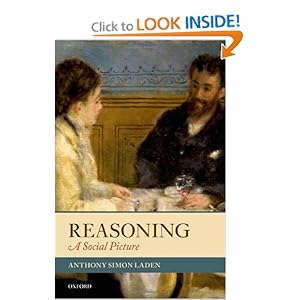- Facebook292
- Total 292
In Reasoning: A Social Picture, Anthony Simon Laden (who’s visiting Tufts today ) argues that there’s a “standard picture of reasoning” in which the goal is to reach conclusions. You can reason alone, but when people reason together, they assert propositions, back them up with reasons, and strive for assent. Success means reaching a conclusion as reliably and efficiently as possible.
) argues that there’s a “standard picture of reasoning” in which the goal is to reach conclusions. You can reason alone, but when people reason together, they assert propositions, back them up with reasons, and strive for assent. Success means reaching a conclusion as reliably and efficiently as possible.
Laden argues that this picture cannot make sense of a valuable and pervasive kind of reasoning that is quite different. Sometimes when we reason, it is not to reach a conclusion but to engage in an activity with someone else that strengthens the relationship, whether that is a civic bond, a friendship, or a romantic or familial tie. I reason with you to learn what you think, to share my views with you, to seek whatever common ground we can, and to see if we can live together rather than in parallel. A characteristic activity of this kind of reasoning is not asserting that P, but inviting a response: What do you think–can we agree that P? Reasoning is “responsive engagement with others as we attune ourselves to one another and the world around us.”
Just as there are good and bad arguments that P, so there are good and bad ways of reasoning together in Laden’s sense. But some of the norms are quite different. A particularly strong argument is one that ends the discussion. But a particularly skillful conversational invitation is one that prolongs the discussion in ways that satisfy both parties. Laden says that his view is anti-foundationalist, because one unhelpful kind of reasoning involves asserting beliefs as bedrock, self-evident, or transcendent. If someone asserts that Jesus is his personal savior, that all history is the history of the class struggle, or that science produces the only truths, that ends the conversation and so makes the individual less reasonable, on Laden’s view.
Here is where I prefer my own account of moral thought as a network of beliefs connected by various kinds of ties (not just logical entailments, but also empirical generalizations, rules-of-thumb, and family resemblances). I don’t think we can declare a person unreasonable because he holds strong commitments. None of the beliefs I listed above happen to persuade me, but I am equally fixed on other beliefs, such as my love for my own family. The fact that I am not really open to discussing that doesn’t render me unreasonable.
But to converse reasonably with others, it does help to have a moral network map with certain features:
1. You shouldn’t keep returning to a few nonnegotiable principles. It’s fine, for example, to hold religious beliefs as a matter of faith. But if you constantly and immediately cite those beliefs, it’s impossible to reason with you. To put the point in network terms, your map can include nodes that are fixed points, but they ought not carry all the traffic. It should be possible to route around them.
2. You should have more beliefs rather than fewer. It is easier to converse with someone who has many interests, commitments, and ideas, because these are points of contact. Such a person is like an organic molecule with lots of surfaces for other molecules to bond to. Yet,
3. Each belief should connect to others in ways that you can explain. That way, to engage me on my belief A provides an entree to discussing my beliefs B and C. If many of my beliefs and commitments are singletons (in network terms), the conversation quickly dies.
Network analysis helps us see what makes a good conversationalist, but it does not show that being a reasonable conversation-partner is morally valuable. Perhaps it is more important to be good and right. That is what people typically say when they have neatly organized and simple mental networks that revolve around a few nodes, whether God, science, liberty, nature, or something else. They say: “It’s all very well to reason civilly and responsively with other people, but what really matters is my belief P.”
Well, it could be true that P. For instance, it could be true that God has laid out all the commandments for how to live, and we’ll see that for certain in the next life. But in this life, I don’t know how we can know that P except by reasoning with other people. Conclusive arguments are scarce in the moral domain; mainly, they are refutations of particular views that turn out to be inconsistent. But although conclusive arguments are scarce, we come to believe things collectively by discussing them. When the discussion is inclusive, fallibilist, and responsive to everyone’s contributions, the results are better. I am not quite sure whether reasonable conversations increase the odds that we reach the right conclusions, or rather that we create something desirable when we make our moral world by reasoning together. (In other words, I am not sure whether to characterize the activity as discovery or creation.) But the practical conclusion is the same either way. It is most important to be a reasonable interlocutor. That does not rule out holding fixed beliefs, but they must supply just some of the nodes in your moral network, and they cannot be overly central.